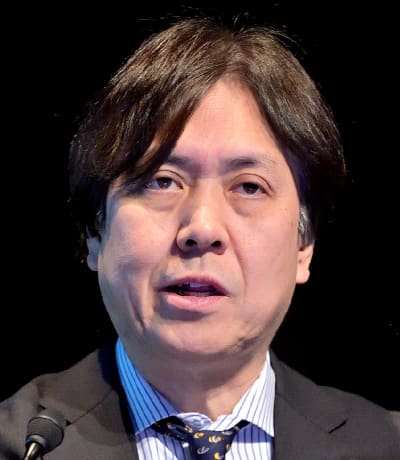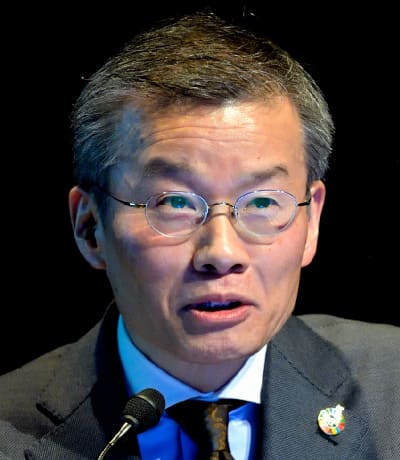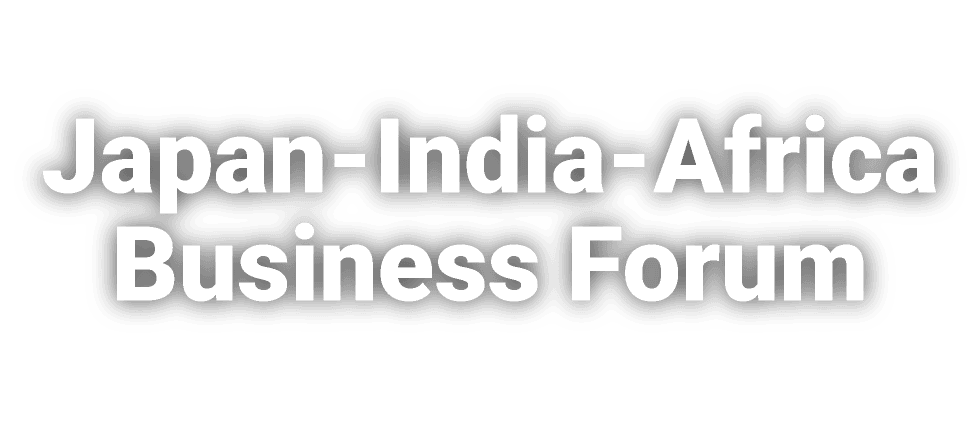Keynote Speeches
Delivering keynote speeches at the forum were Masayoshi Arai, the director-general of the Trade Policy Bureau at METI, and Ichiro Hara, a managing director at Keidanren (Japan Business Federation).
Strengthening connectivity between the Indian Ocean Economic Zone and Africa
Masayoshi Arai, Director-General, Trade Policy Bureau, METI
Arai highlighted the METI commitment to promoting Japanese business in Africa from platforms in India. He noted that India’s impressive economic growth of recent years has stimulated interest at Japanese companies in investing there. Arai cited survey findings by the Japan External Trade Organization (JETRO) about if and where internationally active Japanese companies have plans to expand their overseas operations. Whereas just 47.0% of the respondents overall indicated plans for expanded overseas investment, 75.6% expressed plans to expand in India.
Arai observed that the geopolitical risk posed by exposure to China has become a serious concern at Japanese companies. He remarked that, in contrast, Japanese investment in Southeast Asia and in India is growing and that some Japanese companies are exporting goods to Africa from manufacturing platforms in India. Arai offered the examples of Suzuki Motor and Daikin Industries.
Suzuki’s Indian subsidiary Maruti Suzuki, Arai reported, has an annual production capacity of 2,350,000 passenger cars and is moving to increase that capacity to 4 million by 2030. Such African nations as South Africa and Côte d’Ivoire, Arai noted, are important export destinations for the company. Daikin, meanwhile, exports air conditioners from India to Kenya, Tanzania, Rwanda, and Burundi, he explained, and air conditioner parts to Nigeria for assembly by the Daikin distributor there.
METI launched the Initiative for Japan-India Industry Co-Creation in July 2023 to promote Japanese activity in cultivating new markets in Africa and elsewhere. The initiative provides for bilateral cooperation in encouraging Japanese companies to form industrial clusters in India and to work from Indian platforms in nurturing business and investment in Africa.
Arai concluded with a mention of the then-upcoming 2025 World Exposition in Osaka. He expressed high expectations of the exposition to offset the fragmentation that is rending the world and to serve as an opportunity for reaffirming connectiveness among all nations, including those in the Global South. And he urged members of his audience who could attend the exposition to do so.
Proposals for enhancing partnership with the Global South
Ichiro Hara, Managing Director, Keidanren (Japan Business Federation)
Japan’s challenge in engaging with the Global South, argued Hara, is to be a presence that counterparts will select as a partner. Drawing on an in-depth proposal issued by Keidanren in April 2024, he discussed approaches to meeting that challenge.
Hara invoked three compelling reasons for Japan to strengthen its partnership with the Global South: protecting national interests, maintaining and reinforcing international order, and addressing social issues. He offered several considerations for engaging effectively with Global South nations. Japanese need, he suggested, to tailor policies to the nations and regions in question and to allocate resources accordingly.
Among the 11 tools for enhancing partnership cited by Hara were conducting top-level economic diplomacy, holding public-private forums, deploying high-quality infrastructure, establishing economic partnership agreements and other economic agreements, and cooperating with third countries. He called for concrete initiatives that will enable Japanese and Indian companies to collaboratively develop markets across Africa.
Japan needs to be alert, Hara added, to the social issues that each nation faces and to contribute to alleviating and solving those issues. He emphasized the importance of dealing with partners as equals and being nonjudgmental in working with nations, regardless of the political systems they have adopted.
Session 1
Potential and Challenges of the Mega Economic Zone
On hand for Session 1 were Takamasa Mataki, the group manager of the Infrastructure Industry Transformation Group in the Sustainability Business Consulting Department at Nomura Research Institute; Takahiro Sato, a professor and deputy director of the Research Institute of Economics and Business Administration at Kobe University; Bidisha Ganguly, the chief economist at the Confederation of Indian Industry (CII); and Katsura Daikuhara, the chief economist, a managing director, and the head of Country Research and Intelligence at SMBC Bank International. Moderating the session was Go Yamada, the principal economist at the Japan Center for Economic Research.
Takamasa Mataki, Group Manager, Infrastructure Industry Transformation Group, Sustainability Business Consulting Department, Nomura Research Institute
Takahiro Sato, Professor and Deputy Director of the Research Institute of Economics and Business Administration, Kobe University
Bidisha Ganguly, Chief Economist, Confederation of Indian Industry (CII)
Katsura Daikuhara, Chief Economist, Managing Director, Head of Country Research and Intelligence, SMBC Bank International
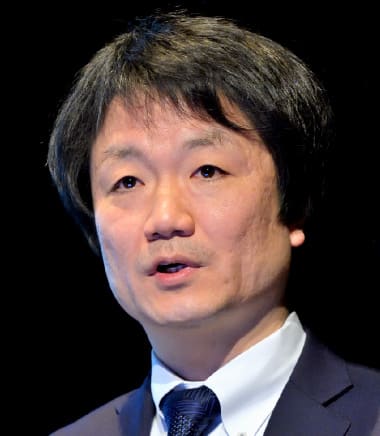
Takamasa Mataki
Mataki provided a definition for the “mega economic zone” of the session title: The Western Global South is an emerging economic zone that includes India and other Southwest Asian nations, Central Asia, the Middle East, and Africa and that will be comparable to China and Europe in economic scale. Characterizing that zone, he added, will be the formation of a vast consumer market, movement toward becoming a global export hub, partnership and economic interdependence between India and Africa, and R&D that will spawn new technologies and new industries. He cited data regarding direct investment by Japanese companies that indicates that among a sample of 4,763 Japanese companies that have made direct investment in China and Southeast Asia only 860 have invested in India and only 75 in Africa. Mataki presented Nomura Research Institute’s forecasts that nominal GDP growth in the Western Global South will outpace that in the United States, Europe, and China in the years to 2050.
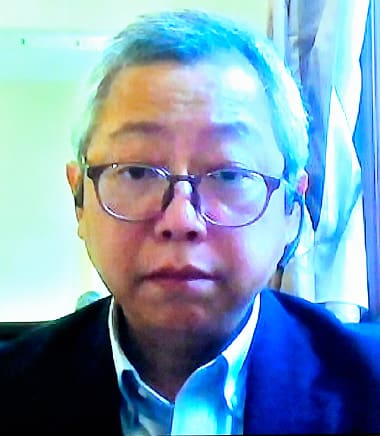
Takahiro Sato
Sato, a leading Japanese authority on the Indian economy, focused in his remarks on two subjects: the activity of Japanese companies in India and India’s economic engagement with Africa. The GDP growth for Japanese companies in India has been spectacular in comparison with Japan’s GDP growth. GDP generated by Japanese companies in India, Sato reported, increased 29-fold from 1995 to 2021 while Japan’s nominal GDP was growing only 6%. Sato noted that India has become the world’s fourth-largest producer of automobiles and that Japan’s Suzuki Motors is India’s largest automaker by far. And he noted that India has become the world’s largest manufacturer of motorcycles and that Japan’s Honda is India’s second-largest manufacturer in that product category. As for India’s economic engagement with Africa, Sato highlighted the Asia-Africa Growth Corridor proposed in 2016 by Indian Prime Minister Narendra Modi and Japan’s then–Prime Minister Shinzo Abe. That mechanism would function in parallel with the India-Middle East-Europe Corridor, an initiative launched in 2023.
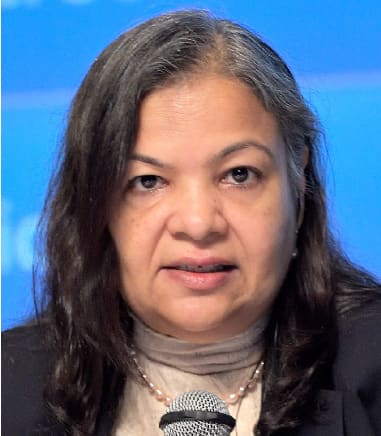
Bidisha Ganguly
“This may be the right time,” suggested Ganguly, “to rejuvenate the trilateral cooperation between Japan, India, and Africa. Global supply chains are shifting. Companies are looking for new markets and for new locations for their investments. Japanese companies are known for their technological excellence. Indian companies are known for their low-cost innovation and their skilled human resources. And Africa is a continent full of opportunities.” Ganguly emphasized that Indian companies are proactive investors in Africa. She displayed the logos of around 40 Indian companies that are active in Africa in nine industrial sectors: automobiles and automotive components; pharmaceuticals; IT and consulting; steel and cement; engineering and infrastructure; consumer goods; agriculture and food processing; oil, energy, and petrochemicals; and telecommunications.
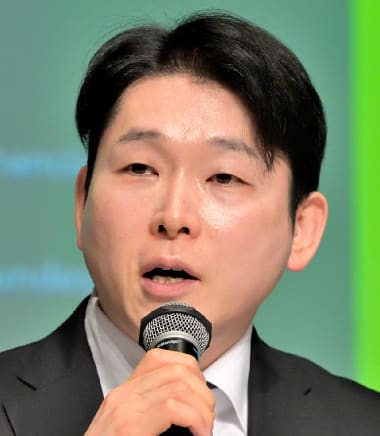
Katsura Daikuhara
Daikuhara acknowledged a common prejudice about Africa and countered it with an update on the continent’s reality: “People often associate Africa with poverty, armed conflict, and corruption, but things have changed significantly over the 10 years that I’ve been visiting. Nations have implemented structural reforms, and long-standing autocratic regimes have peacefully transitioned to democratically elected successors.” He noted that China has been more aggressive than Japan or India in investing in Africa but that its investment has slowed in recent years. That slowdown, he explained, is due to the oppressive debt incurred by some African beneficiaries of China’s Belt and Road initiative. Daikuhara included in his presentation photos he had taken of an airport in Maputo, Mozambique, and an expressway in Nairobi, Kenya, financed by China and of a Chinese language school in Lusaka, Zambia. “Learn Chinese, Double Your World,” reads the sign at the school entrance.
